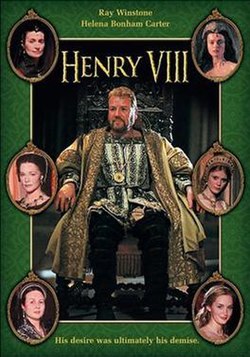Episode 1
The first episode opens to reveal a dying Henry VII mistaking his heir Henry VIII for his late son Arthur Tudor. Concerned for the fragile chances of his family's dynasty, the dying king implores his son to marry his brother's widow Catherine of Aragon and have a son to secure the family line. Fifteen years later Henry VIII is the most popular King to ever sit on the throne, but he still does not have a son by his Queen, only a daughter Mary. Elsewhere at Hever Castle in Kent the Boleyn Family celebrate the engagement of their daughter Anne to Henry Percy the future Earl of Northumberland. The head of the family the Duke of Norfolk assures her father, Thomas Boleyn, that he has the king's ear on the match and that he will give them permission to marry. But once the roving eye of the king falls upon Anne, he quickly finds a reason for the marriage to be cancelled and wastes no time in persuading her for himself, even riding from his secluded coastal castle to Kent during an outbreak of illness. Resolved that Anne will not become his mistress, but his wife, the King instructs his chancellor Cardinal Wolsey to find a way for his marriage to his devoted wife to be annulled, prompting two opportunistic Protestants reformers, Thomas Cromwell and Thomas Cranmer, to provide a way for the king to marry Anne Boleyn and bring untold wealth to his pocket but only if he breaks with the Catholic Church. Finally, his wife Anne is soon pregnant, only for Henry's hopes to be dashed. Instead of the longed for son and heir, Anne delivers a daughter, Elizabeth, and Henry's ardor cools towards her, even more so when he meets the sister of two of his courtiers, Jane Seymour. Despite the growing tensions between the King and Queen, Anne becomes pregnant once more but goes into premature labor and delivers a stillborn son. The first episode ends with an angry King Henry demanding Cromwell get rid of Anne which results in her subsequent trial and execution.
Episode 2
The second episode begins with Jane Seymour being dressed for her wedding and her subsequent introduction to the people who take her to their hearts, whilst the King and Cromwell differ on the dissolution of the monasteries which have angered the English Catholics and united them into a huge army to march on London in protest calling it, the Pilgrimage of Grace, headed by the King's former comrade Robert Aske whom the King tricks into incriminating himself into treason and is sentenced to a gruesome traitor's death. The country is on edge as the Queen goes into labour and finally gives birth to a son much to Henry's joy although it is cut short when the Queen dies. Two years after the Queen's death, Cromwell, whose power has steadily risen through the days of Anne Boleyn encourages the King to consider marrying the Protestant Anne of Cleves but once he sets sights on her, the King is repulsed and immediately seeks a way out of the marriage. Seeing the decline of Protestant influence, the Duke of Norfolk devises a way to snatch the reins of power and arranges for his teenage niece Catherine Howard to enchant the increasingly obese and terrifying King and to eventually marry him.
It soon transpires that the young Queen has a promiscuous history and is having an affair with a man in the king's service which the Protestant reformers seize as their opportunity to rid themselves of the Catholic faction. The Queen and her family are arrested and the young Queen dies at the hands of the executioner, like her cousin Anne Boleyn. With the demise of Catholic peers the reformers take the opportunity to consolidate their power, enhanced by the wedding of the king to Catherine Parr who attempts to unite the royal family. The film closes as the King reflects on his past loves. His obsession with Anne Boleyn, his quiet but steady affection for Jane Seymour and his lust for the young Catherine Howard. Finally the king's over indulgent life catches up with him and he suffers a seizure and later dies in a scene reminiscent of the film's opening, imploring his son to be successful as a man before he can be successful as a king. He dies with his son and last wife beside him.
The closing scene of the film provides a summary of the lives of the remaining characters,
Edward became King Edward VI, but his health was frail. He died of consumption aged fifteen. Edward Seymour, Lord Protector of England, he ruled by proxy until 1551 when he was imprisoned in the Tower and beheaded. Thomas Seymour did finally marry Catherine Parr, but broke her heart when he attempted to seduce the fourteen-year-old Princess Elizabeth. He was executed for treason in 1549. Bloody Mary came to the throne in 1553. She burned hundreds of Protestants as heretics and died embittered and unloved in 1558. Anne of Cleves outlived all the wives. Widely liked and respected, she was buried rich and popular with full honours. Thomas Cranmer continued to lay the foundations for the Church of England, only to be arrested for treason on the orders of Mary I and burnt as a heretic. And what of Henry? After a lifelong struggle to give England an heir, his glorious successor was not a son, but a daughter. Elizabeth I, daughter of Henry and Anne Boleyn came to the throne in 1558 and ruled England for 45 years.
